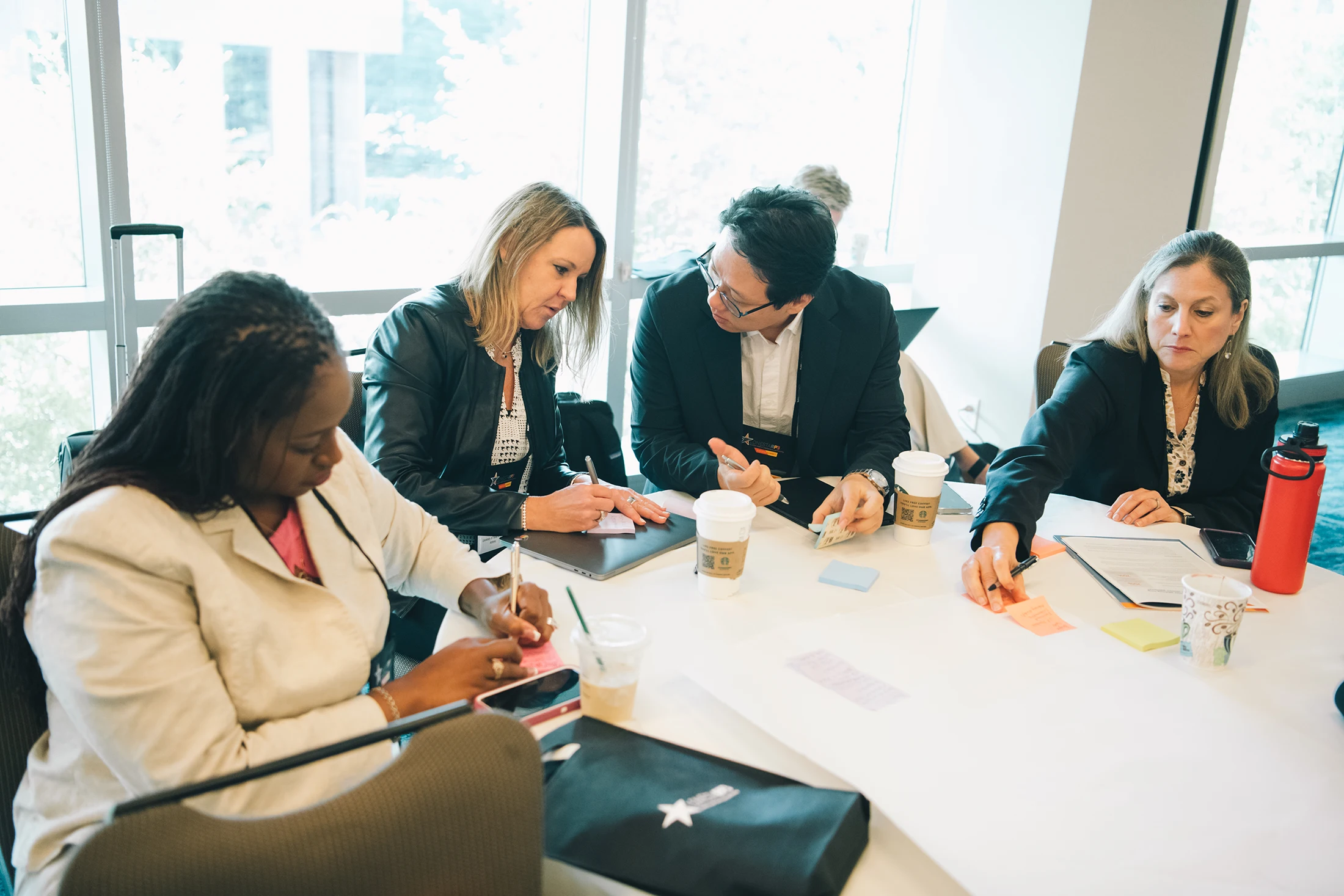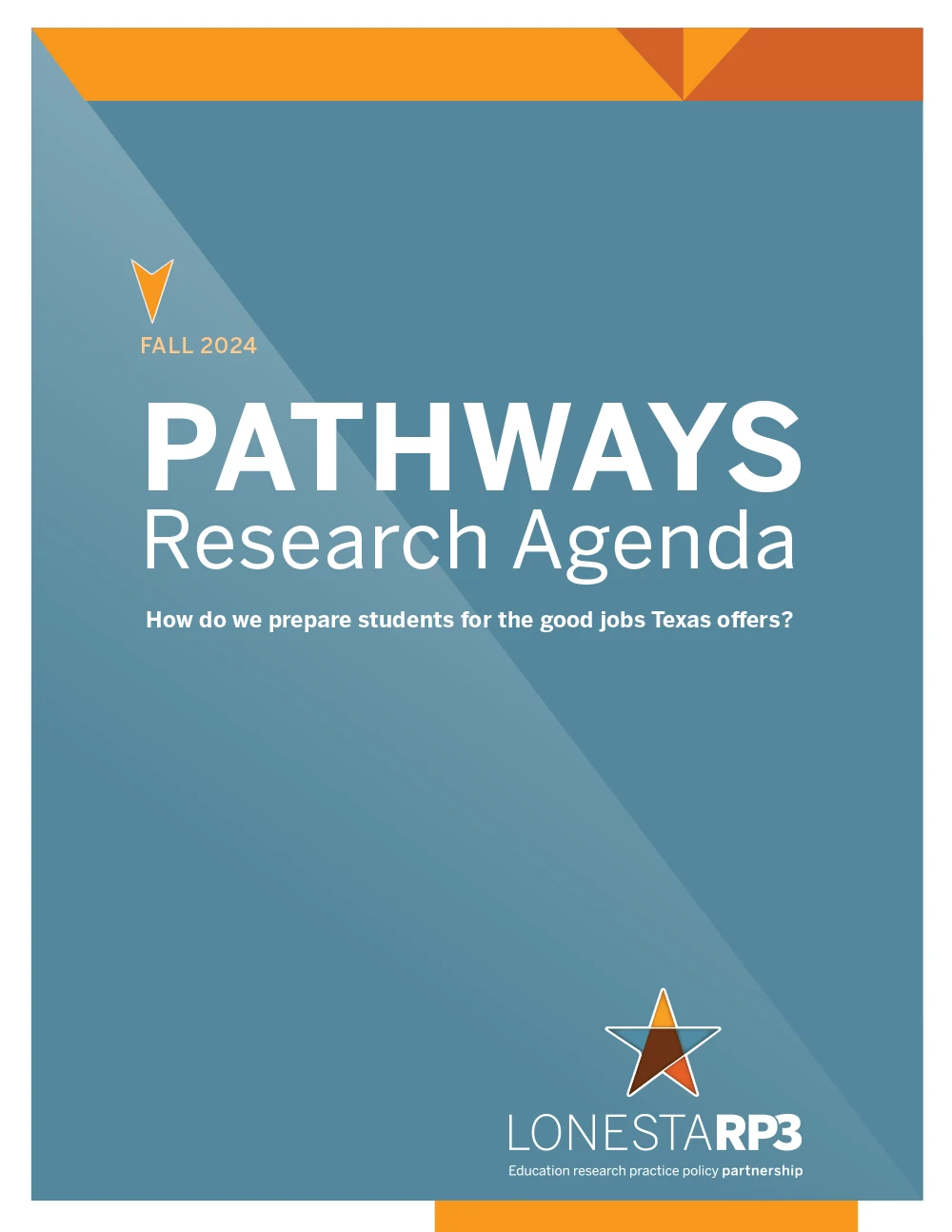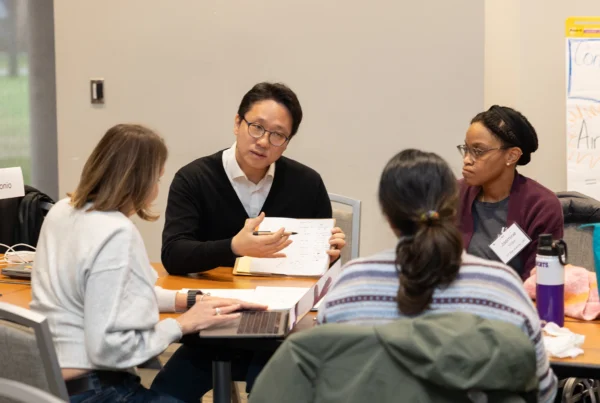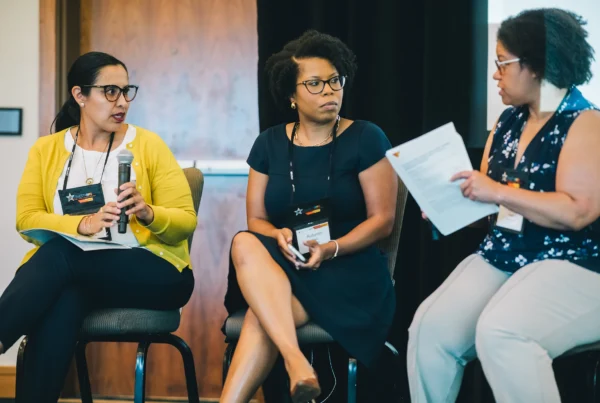In September 2024, LONESTARP3 released its Pathways Research Agenda at its inaugural Success Summit. This gathering of decision-makers, practitioners, and researchers from across the state provided a forum to explore the proposed research strands and consider their implications for policy and practice.
This convening was the culmination of efforts to build a shared set of research priorities that will be conducted in service to the state of Texas. Ten researchers from across the state were invited to lead the work and build teams – Research Collaboratives – to include the necessary expertise and perspectives to design and conduct investigations. Investment from the Gates Foundation and the Moody Foundation is powering their efforts.
Building on the momentum from the Summit, these Research Collaboratives are moving beyond defining the problem, and are actively seeking insights, evidence and solutions. If you imagine the Pathways Research Agenda as a 10,000-foot view of education issues, the Research Collaboratives are a magnifying glass to explore these issues and look for answers. By design, the researchers involved are from different regions, organizations, and research backgrounds. They share a common goal of improving student access to and success through postsecondary education opportunities for all Texans.

Our researchers were asked to lead their projects as Research Collaboratives – this name is both intentional and aspirational.
Intentional. LONESTARP3 assembled resources for our collaboratives to have a strong start and to create common ground, including: prior work of LONESTARP3 members, and a scan of Texas Literature on relevant topics. Collaboratives were designed to span different areas, organizations, experiences, and, for some teams, even time zones to ensure that their work represents the full diversity of Texas.
Aspirational. Collaboratives aim to include community partners to be part of as well as to learn from the research. Collaboratives will welcome local practitioners as active contributors in project design, data collection, and interpretation. Collaboratives aspire to conduct agile, rapid, and responsive investigations that can surface meaningful insights for practitioners and policy advocates in 12-18 months.
At the end of their research, each Collaborative will have a compelling story to tell on the state of their research area. But we won’t wait until the end to learn from their work. We release “Collaborative Stories” throughout the year to authentically illustrate the ups and downs of partnership research.
Activities Planned Across Research Collaboratives
The range of research topics in our Pathways Research Agenda requires a variety of talent, expertise, and perspectives. Below we offer a snapshot of the members and methods in each Research Collaborative.
31
Researchers
Including 10
Student Researchers
6
Universities
- Rice University
- Texas Tech University
- The University of Texas at Austin
- The University of Texas at El Paso
- The University of Texas at Rio Grande Valley
- The University of Texas at San Antonio
5
Non-profit organizations
- Commit Partnership
- E3 Alliance
- Ray Marshall Center
- Texas College Access Network
- UP Partnership
Three of our four collaboratives are using Education Research Center (ERC) data as a central part of their research investigations. The ERC is a State Longitudinal Data System (SLDS) which contains a broad range of administrative records at the student- and school-level, connected across levels and into the workforce. One of our collaboratives is using machine learning to help unpack this data. Three collaboratives will bring first-hand perspectives from their community through surveys, focus groups, and interviews.
13
ERC users
*Accessing 1.5+B education/wage records
300
Survey respondents
40
Focus group participants
75
Interview participants
Unique Activity: Web Data Extraction
Unique Activity: Machine Learning Model
Implementing the Pathways Research Agenda

Strand 1: Academic and Career Advising
This research collaborative will lay the groundwork for answering questions in the Pathways Research Agenda. They will create an interactive webpage where users can search and view College Advising Programs (CAPs) in the state by characteristics, such as regions and districts served, grade-levels served, student populations, advising features, training, student-to-advisor ratios, governance, funding models, and key goals and metrics. Their work will start with using technology to pull down as much public information as possible from CAP websites.

Strand 2: Dual Credit Academic and Workforce Education
This research collaborative will be driven by three goals. First, to understand dual credit course availability and participation patterns. Second, to understand AP and IB availability and participation patterns. Both of these goals include understanding quantitative variations in course offerings, student participation, teacher characteristics, and school location. And last, to qualitatively explore the factors that influence how and why students choose between early college options. This work is centered in the counties surrounding San Antonio with a complementary focus in El Paso.

Strand 3: Workforce-Aligned Instruction
This research collaborative is using mixed methods to gain an overall understanding of industry-based certifications (IBCs) in the state, with a focus on Rio Grande Valley and El Paso. The qualitative part of this project is designed to understand the alignment between the IBC offerings and participation in school districts, and the workforce skills needed by local employers. The quantitative analysis will investigate regional and district IBC-CTE alignment by programs of study, and IBC alignment with high-demand fields.

Strand 4: Postsecondary Pursuits
This research collaborative will analyze ERC data combined with National Student Clearinghouse data to learn how well College and Career Readiness (CCR) indicators align with graduate outcomes up to six years after high school. This statewide, quantitative will identify readiness pathways based on student experiences, then use predictive modeling to assess the role of those readiness pathways in postsecondary success.
The Research Collaborative Experience
We talked with each team to get a sense of their experiences thus far as the first Research Collaboratives funded by LONESTARP3, and several clear themes came through. Researchers stressed the importance of community and connection. They appreciate building partnerships across institutions, disciplines, roles and regions. Many said it felt rare and exciting to work alongside people from advocacy groups, school districts, workforce boards, and other universities. These connections make their research feel stronger and more meaningful.
LonestaRP3 is a great resource not only for connecting researchers from across the state, but also connecting researchers with policymakers, educational reformers, and school and district leaders that helps ensure that our research is informed by the challenges these stakeholders are facing and facilitates our ability to share our research directly with the folks best positioned to change educational systems.”
~Matt Giani
Partnership and mutual respect were also noted. Team members said the environment was friendly and open. Even though they come from different backgrounds, they work well together and value each other’s ideas. Many said they don’t sense competition often found in other research projects. The support and structure from LONESTARP3 help make collaboration smooth and productive. Teams also spoke about the need for applied research that makes a difference. They said they are energized knowing their work can help real people, like students and school leaders, not just produce journal articles. Many are excited to focus on creating research that informs decisions and solves problems in the community. Still others shared how important communication and feedback have been, stating that regular meetings and informal conversations have help everyone stay connected. Overall, teams described a collaborative spirit centered on connection, respect, shared goals, and real-world impact.
We are doing real policy work here. I’ve gotten a crash course in tangible outcomes. Even if we do find really cool results, is it tangible? It’s the big question of “why does this matter” and “who can we help” with our analysis. The cool stuff is part of the work, but the tangible piece is part of it too, and is at the front of my mind.”
~Jen Freeman






